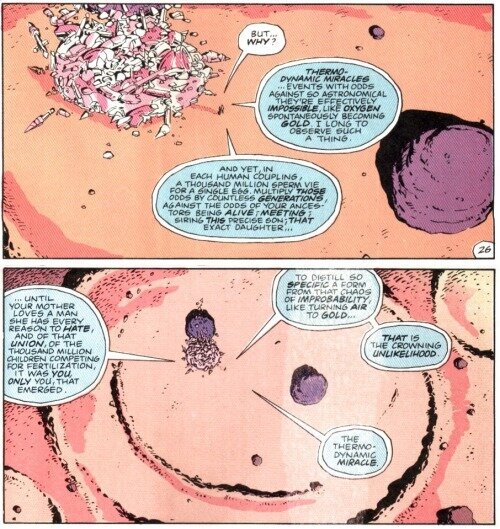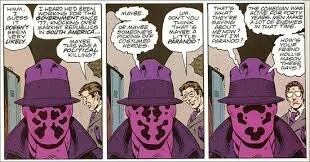Watchmen, Episode 5: Seven Years of Bad Luck
This episode was something of a watershed, but not just because the plot finally starts coming together. It’s because of how the plot comes together, and how it engages the graphic novel more directly than any of the four that preceded it.
On a good night (when the kid is quiet and there isn’t a huge amount of prep for the next day’s classes), I screen the latest episode of Watchmen with my wife. She loves the show, but she’s never read the comic (easily one of my top 5 failures in 20 years of marriage).[1] This provides ample room for extensive mansplaining, except… most of the time when she asks a question, I’ll say, “I dunno. It wasn’t in the comic.” Certainly, knowing the graphic novel backwards and forwards makes the show even more delightful, but nearly everything I’ve explained to her over the first four episodes has been non-essential.
That is not the case with “Little Fear of Lightning.” From the moment we find ourselves in Hoboken on November 2, 1985, she’s at a competitive disadvantage. This is not to say that the episode doesn’t bring non-book readers up-to-speed; it does But, in serving two district audiences, the makers of Watchmen are stuck placating two very different masters. When I see a devastated Manhattan fused with the remains of a giant alien squid, I feel the delayed gratification of a return to the comic. This is a moment of confirmation and even explanation. For someone who hasn’t read the book, though, it’s yet another WTF.
WATCHMEN TAKES PLACE IN AN ALTERNATE WORLD WHERE DISNEY DIDN’T TAKE OVER MIDTOWN MANHATTAN ,THANKS TO A GIANT SQUID
Nonreaders are not in a position to separate new information from the old here, because it’s all new. While the episode works brilliantly, the different expectations brought by the two main segments of the audience reminds me of the main reason Watchmen was supposed to be unfilmable: with its multiple, parallel narrations, interpolated pirate plots, and ongoing counterpoint between caption and panel, Watchmen throws more information at the reader than any viewer could be expected to apprehend in real time. The comic reader controls the pace of the experience, and therefore has the tools to cope with the informational onslaught. But on television? To quote from a classic sci-fi drama:
There is nothing wrong with your television set. Do not attempt to adjust the picture. We are controlling transmission. If we wish to make it louder, we will bring up the volume. If we wish to make it softer, we will tune it to a whisper. We will control the horizontal. We will control the vertical. We can roll the image, make it flutter. We can change the focus to a soft blur or sharpen it to crystal clarity. For the next hour, sit quietly and we will control all that you see and hear. We repeat: there is nothing wrong with your television set. You are about to participate in a great adventure. You are about to experience the awe and mystery which reaches from the inner mind to – The Outer Limits.
So, yeah. Good luck with that.
Please Don’t Give Me What I Want
Of course, this is not my problem. I’m what the A.V. Club calls an “expert viewer.” I should be thrilled to see the show finally meet up with the book. Why aren’t I?
I think it’s because I’m not just an expert Watchmen viewer; I’m an expert Lindelof viewer. Lost was a classic puzzle box show, which encouraged its viewers to try to unravel its mysteries, but was unlikely to satisfy a large segment of the viewers, at least in part because the mysteries were being made up and solved by the writers more or less in real time. We were all trying to suss out a plan that wasn’t really a plan. [2]
Next comes The Leftovers. Now Lindelof was working on a project based on a novel that utterly rejected the idea of an explanation. This worked perfectly for the showrunner’s post-Lost career. Again and again, he reassure anyone listening that the show was never going to reveal what caused two percent of the world’s population to disappear, not was it going to build the plot around the search for an answer. This was the very opposite of a puzzle box, and it worked without a hitch.
If Lost is the thesis and The Leftovers is the antithesis, perhaps Watchmen will be the synthesis. There’s a whole heap of mysteries, but also every expectation that they can be solved. Yet at the same time, the mysteries are, at least for me, far from the most compelling aspect of the show. Or rather, they’re compelling, but they don’t make me want to solve them. They are tiny thermodynamic miracles, like oxygen spontaneously becoming gold. I long to observe such a thing.
But maybe I’m just lagging behind, like Leftovers viewers who wanted it to be a lost-like puzzle. I want this to be more like The Leftovers, and let the mystery be.
Or maybe I just want to be a watchman.
Shades of Rorschach
Walter Kovacs has been dead for years, but, just as so many real-life comic fans think of him as a hero, his afterlife in the world of the television show is a set of ironic contradictions. The 7th Kavalry have learned all the wrong lessons from Rorschach, but turning him into an icon for radical racists is an easy extrapolation from the character’s reflexive misogyny. Plus there’s the metaphor inherent in his mask, which consists of black and white shapes that move around but never combine. What better image for people who are against race mixing?
But Looking Glass, the main character in “Little Fear of Lightning,” also looks a lot like Rorschach, a resemblance that this episode pointedly plays up. In the comics, Rorschach lifts up the lower part of his mask so he can eat beans out of a can. So does Looking Glass (while watching gay superhero porn). While Looking Glass does speak in complete sentences (even using personal pronouns!) there is something a bit Rorschach-like about his slow and laconic use of language.
BEWARE OF COOTIES
No doubt Looking Glass is an improvement on the original. Walter Kovacs, disgusted by everything feminine, had all the makings of a serial killer without actually being one. He was a serial killer once removed. Wade, by contrast, doesn’t hate women, and has even had relationships with them, but his sheltered Jehovah’s Witness upbringing and the cruel betrayal by the Top Knot woman in the first scene has left him guarded. After being stripped naked by a woman in Hoboken and driven nearly mad by the Squid, Wade takes no chances. Am I the only one who thinks that he’s basically wrapping his head in a giant condom?
The models for Rorschach were two Steve Ditko creations, Mr. A. and The Question. Mr. A was the embodiment of Randian positive dogmatism (“A=A”), conferring upon Rorschach his total rejection of nuance. The Question was a walking conundrum, inspiring both Rorschach’s mask and his insistence on incontrovertible truth. Looking Glass, with his uncanny ability to detect lies, is less The Question than The Answer. Like the Comedian, he has a nose for bullshit.
In one of the episode’s many callbacks to the graphic novel, Looking Glass is faced with a variation of Rorschach’s dilemma a the end of the comic. Rorschach died rather than protect Adrian Veidt’s scheme, even if telling the truth could bring the world back to the bring of armageddon. More than three decades later, Wade is confronted with the same revelation. We have yet to see what he does with it, but Wade has already shown a greater capacity for compromise than Walter Kovacs ever did.
Assorted Observations
The punkish gang members in 1985 are the Knot Tops, who appeared through the comics series. At the time, they looked outlandish. Now they barely stand out. Moore and Gibbons were true prophets: they predicted the man bun.
In the comics, Adrian Veidt had marketed a perfume called Nostalgia. Now we have a drug. Chances are good that this memory pill is going to have an interesting metafictional resonance, since the Squid Incident involved filling people’s heads with horrific imagery dreamed up by a writer/artist pair. Storytelling is about opening your mind to someone else’s thoughts and letting them play house in your unconscious. Looking Glass, traumatized by 11/2, spends his life shielding himself from subsequent invasion, while Angela goes all in.
Moore and Gibbons let us know what comics would be like in a world full of superheroes. Now Lindelof and Co tell us that, post 11/2, Spielberg will win an Oscar for an 11/2 drama instead of Schindler’s List. Nice touch.
So which planet’s moon is Veidt actually on? I would have assumed Mars, but the image looked more like Jupiter. The arrangement of the clones’ corpses was very Tales of the Black Freighter. I couldn’t help but wonder, though: if the point of having the clones on the lunar surface was to give Veidt the materials for spelling out “Save me” in giant letters, couldn’t he have just catapulted something else to make the letters and cut down on the body count?
Is Veidt’s message meant for Dr. Manhattan? We know it’s not for Rorschach, and not just because he’s dead. On the comic’s first page Rorschach writes that when everyone looks up to him and shouts “Save me!” he’ll look down and say “No."
How is it that Adrian Veidt, who congratulates himself in Watchmen Issue 11 about not being some Republic serial villain revealing his plans to the heroes, leaves behind such an incriminating video? And why does joining the Appropriations Committee give Keane access to it? I wonder if Wade’s Looking Glass Sense is tingling.
Notes
[1] I pride myself in managing not to push the book on her like Alvy Singer frogmarching a date to see The Sorrow and the Pity.
[2] See also the biggest mistake in Ronald Moore’s framing of the Battlestar Galactica remake: “The Cylons were created by man. They evolved. They rebelled. There are many copies. And they have a plan.” Except, uh, they didn’t. And Moore even admits as much in post-BSG interviews.
Comments (3)
Hoschi 8 months ago · 0 Likes
I just wanted to tell you that I absolutely love your blog. It makes watching the show a better and deeper experience. This is what the Internet was invented for (and meddling with elections). So keep up the good work, I will definitely be on board and follow your every word.
Eliot Borenstein 8 months ago · 0 Likes
That is so kind of you to say! Thank you! I'm on the West Coast at a conference now, and just about to watch the latest episode 12 hours later. But you've inspired me to keep up.
Eliot Borenstein 8 months ago · 0 Likes
And then when I get home I can get back to the really important stuff: meddling with elections.



